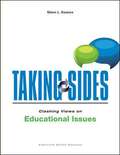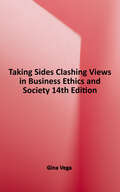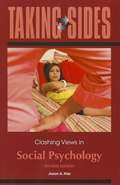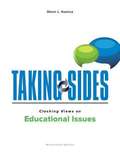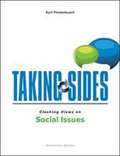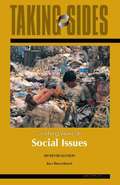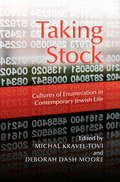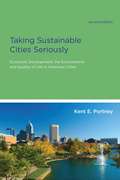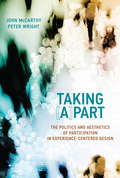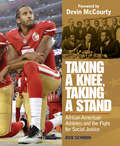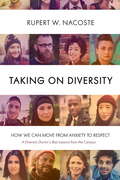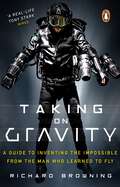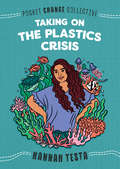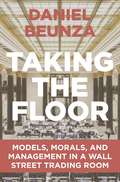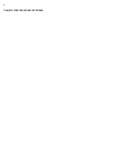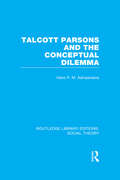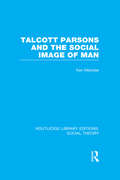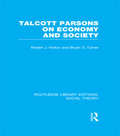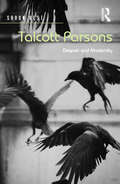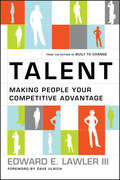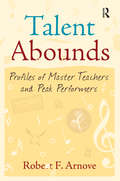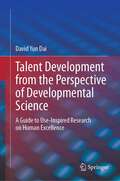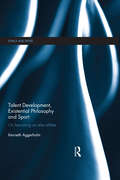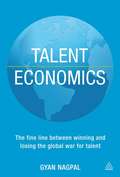- Table View
- List View
Taking Sides: Clashing Views an Educational Issues (Expanded Eighteenth Edition)
by Glenn KoonceThe Taking Sides Collection on McGraw-Hill Create(tm) includes current controversial issues in a debate-style format designed to stimulate student interest and develop critical thinking skills. This Collection contains a multitude of current and classic issues to enhance and customize your course. You can browse the entire Taking Sides Collection on Create, or you can search by topic, author, or keywords. Each Taking Sides issues is thoughtfully framed with Learning Outcomes, an Issue Summary, an Introduction, and an Exploring the Issue section featuring Critical Thinking and Reflection, Is There Common Ground?, and Additional Resources and Internet References. Go to McGraw-Hill Create(tm) at www. mcgrawhillcreate. com, click on the "Collections" tab, and select The Taking Sides Collection to browse the entire Collection. Select individual Taking Sides issues to enhance your course, or access and select the entire Koonce: Taking Sides: Clashing Views on Educational Issues, 18/e Expanded ExpressBook for an easy, pre-built teaching resource by clicking here. An online Instructor's Resource Guide with testing material is available for each Taking Sides volume. Using Taking Sides in the Classroom is also an excellent instructor resource. Visit the Create Central Online Learning Center at www. mhhe. com/createcentral for more details.
Taking Sides: Clashing Views in Business Ethics and Society
by Gina VegaThe Taking Sides Collection on McGraw-Hill Create™ includes current controversial issues in a debate-style format designed to stimulate student interest and develop critical thinking skills. This Collection contains a multitude of current and classic issues to enhance and customize your course. You can browse the entire Taking Sides Collection on Create or you can search by topic, author, or keywords. Each Taking Sides issue is thoughtfully framed with Learning Outcomes, an Issue Summary, an Introduction, and an "Exploring the Issue" section featuring Critical Thinking and Reflection, Is There Common Ground? Additional Resources, and Internet References.
Taking Sides: Clashing Views in Social Psychology (Fourth Edition)
by Jason NierTaking Sides volumes present current controversial issues in a debate-style format designed to stimulate student interest and develop critical thinking skills. Each issue is thoughtfully framed with Learning Outcomes, an Issue Summary, an Introduction, and an Exploring the Issue section featuring Critical Thinking and Reflection, Is There Common Ground?, and Additional Resources. Taking Sides readers also offer a Topic Guide and an annotated listing of Internet References for further consideration of the issues. An online Instructor’s Resource Guide with testing material is available for each volume. Using Taking Sides in the Classroom is also an excellent instructor resource. Visit www. mhhe. com/takingsides for more details.
Taking Sides: Clashing Views on Educational Issues (19th Edition)
by Glenn L. KoonceThis book presents opposing or sharply varying viewpoints on educational issues of current concerns. Unit 1 offers consideration of three basic theoretical issues that have been discussed by scholars and practitioners in past decades and are still debated today: curriculum content and its imposition upon the young, the philosophical underpinning of the process of education, and the purpose of public education. Unit 2 features five issues that are fundamental to understanding the present circumstances that shape American education: democratic classrooms for citizenship preparation, student First Amendment rights, common curriculum considerations, policy and the Common Core standards, and the challenges of poor school performance. Unit 3 examines more specific issues currently being discussed: arming teachers, universal preschool, teacher preparation and the federal government, zero tolerance and the courts, no-zero grading, virtual schools, twenty-first century skills movement, flipped learning, class size and student achievement, school funding and student achievement, charter school expansion, and the impact of technology on teaching and learning.
Taking Sides: Clashing Views on Social Issues
by Kurt FinsterbuschThe Taking Sides Collection on McGraw-Hill Create#65533; includes current controversial issues in a debate-style forma designed to stimulate student interest and develop critical thinking skills. This Collection contains a multitude of current and classic issues to enhance and customize your course. You can browse the entire Taking Sides Collection on Create or you can search by topic, author, or keywords. Each Taking Sides issue is thoughtfully framed with Learning Outcomes, an Issue Summary, an Introduction, and an "Exploring the Issue" section featuring Critical Thinking and Reflection, Is There Common Ground?, Additional Resources, and Internet References. Go to the Taking Sides Collection on McGraw-Hill Create#65533; at www. mcgrawhillcreate. com/takingsides and click on "Explore this Collection" to browse the entire Collection. Select individual Taking Sides issues to enhance your course, or access and select the entire Finsterbusch: Taking Sides: Clashing Views on Social Issues, 19/e book here at http://create. mheducation. com/createonline/index. html#qlink=search%2Ftext%3Disbn:1259666409 for an easy, pre-built teaching resource. Visit http://create. mheducation. com for more information on other McGraw-Hill titles and special collections.
Taking Sides: Clashing Views on Social Issues, 15th Edition
by Kurt FinsterbuschTaking Sides: Clashing Views on Social Issues, Fifteenth Edition, is a debate-style reader designed to introduce students to controversies in sociology. The readings, which represent the arguments of leading social scientists and social commentators, reflect opposing positions and have been selected for their liveliness and substance and because of their value in a debate framework.
Taking Stock: Cultures of Enumeration in Contemporary Jewish Life
by Deborah Dash Moore Michal Kravel-ToviTaking Stock is a collection of lively, original essays that explore the cultures of enumeration that permeate contemporary and modern Jewish life. Speaking to the profound cultural investment in quantified forms of knowledge and representation--whether discussing the Holocaust or counting the numbers of Israeli and American Jews--these essays reveal a social life of Jewish numbers. As they trace the uses of numerical frameworks, they portray how Jews define, negotiate, and enact matters of Jewish collectivity. The contributors offer productive perspectives into ubiquitous yet often overlooked aspects of the modern Jewish experience.
Taking Sustainable Cities Seriously: Economic Development, The Environment, And Quality Of Life In American Cities (American And Comparative Environmental Policy Series)
by Kent E. PortneyToday most major cities have undertaken some form of sustainability initiative. Yet there have been few systematic comparisons across cities, or theoretically grounded considerations of what works and what does not, and why. In Taking Sustainable Cities Seriously, Kent Portney addresses this gap, offering a comprehensive overview and analysis of sustainability programs and policies in American cities. <P><P>After discussing the conceptual underpinnings of sustainability, he examines the local aspects of sustainability; considers the measurement of sustainability and offers an index of "serious" sustainability for the fifty-five largest cities in the country; examines the relationship between sustainability and economic growth; and discusses issues of governance, equity, and implementation. He also offers extensive case studies, with separate chapters on large, medium-size, and small cities, and provides an empirically grounded analysis of why some large cities are more ambitious than others in their sustainability efforts. <P><P> This second edition has been updated throughout, with new material that draws on the latest research. It also offers numerous additional case studies, a new chapter on management and implementation issues, and a greatly expanded comparative analysis of big-city sustainability initiatives. <P><P> Portney shows how cities use the broad rubric of sustainability to achieve particular political ends, and he dispels the notion that only cities that are politically liberal are interested in sustainability. Taking Sustainable Cities Seriously draws a roadmap for effective sustainability initiatives.
Taking Sustainable Cities Seriously: Economic Development, the Environment, and Quality of Life in American Cities
by Kent E. PortneyTaking [A]part: The Politics and Aesthetics of Participation in Experience-Centered Design (Design Thinking, Design Theory)
by Peter Wright John McCarthyA critical inquiry into the value and experience of participation in design research.In Taking [A]part, John McCarthy and Peter Wright consider a series of boundary-pushing research projects in human-computer interaction (HCI) in which the design of digital technology is used to inquire into participative experience. McCarthy and Wright view all of these projects—which range from the public and performative to the private and interpersonal—through the critical lens of participation. Taking participation, in all its variety, as the generative and critical concept allows them to examine the projects as a part of a coherent, responsive movement, allied with other emerging movements in DIY culture and participatory art. Their investigation leads them to rethink such traditional HCI categories as designer and user, maker and developer, researcher and participant, characterizing these relationships instead as mutually responsive and dialogical.McCarthy and Wright explore four genres of participation—understanding the other, building relationships, belonging in community, and participating in publics—and they examine participatory projects that exemplify each genre. These include the Humanaquarium, a participatory musical performance; the Personhood project, in which a researcher and a couple explored the experience of living with dementia; the Prayer Companion project, which developed a technology to inform the prayer life of cloistered nuns; and the development of social media to support participatory publics in settings that range from reality game show fans to on-line deliberative democracies.
Taking a Knee, Taking a Stand: African American Athletes and the Fight for Social Justice
by Bob SchronA history of the activism and achievement of African American athletes from Jesse Owens to Serena Williams to Colin Kaepernick, who advanced the cause of social justice through their outspokenness, commitment, and integrity. Muhammad Ali refused to fight in a war he believed was immoral. Wilma Rudolph retired from track and field to campaign for civil rights. Colin Kaepernick took a knee during the national anthem to draw attention to the oppression of black bodies. Taking a Knee, Taking a Stand tells their stories and the stories of other prominent African American male and female athletes who often risked their careers to fight racial discrimination and promote social justice. From Jackie Robinson breaking the color line in major league baseball to NBA great Bill Russell sitting at the feet of Dr. Martin Luther King at the 1963 March on Washington to Althea Gibson asserting her tennis dominance at a time when many clubs would not allow African Americans to play on their courts, this moving and celebratory history shows how the tradition of black protest in sports has been consistent, necessary, and organic, and that the present crisis of misunderstanding and intolerance demands that this tradition continue as the country struggles toward fairness and equity.
Taking on Diversity
by Rupert NacosteIn this enlightening book, a campus "diversity doctor" relates stories that individuals have shared with him about their anxieties in situations involving people who are in some way different than themselves. Dr. Rupert W. Nacoste regularly counsels students at North Carolina State University about their problems dealing with diversity of all kinds, including of gender, race, ethnicity, and sexual-orientation. Here, he shares his most effective techniques for handling the unavoidable realities of being in a neo-diverse community, whether that means in college or America as a nation. The author's proven "safe space" strategy can be applied to the campus, community groups, churches, and workplaces as a means to facilitate positive dialogue about diversity.In this time of current tensions, students, or "young travelers" as Nacoste fondly refers to them, still have much work ahead of them to achieve mutual respect and understanding. From everyday encounters, parties, and email and social media exchanges, they provide examples of ongoing bigotry: racial slurs and stereotypes are still used; young men continue to project demeaning attitudes toward women; and the heterosexual majority sometimes shows little understanding of the LBGT minority.Dr. Nacoste considers it his role to usher students off the "Wrong-Line train," and he has noticed that as they "leave the station," adults begin to follow their lead. The author demonstrates how we can maintain fairness and respect while still acknowledging our differences. By doing so, we can all learn to meet these challenges using sensitivity to different perspectives, open-minded attitudes, and the recognition that diversity in America is here to stay. From the Trade Paperback edition.
Taking on Gravity: A Guide to Inventing the Impossible from the Man Who Learned to Fly
by Richard Browning**As seen on Top Gear**'Richard Browning is a real-life Tony Stark.' - Wired---------------For fans of Adrian Newey, Guy Martin and Chris Hadfield, in Taking on Gravity inventor Richard Browning tells the inspiring story behind his iconic jet suit, and shares his creative principles for generating true innovation.From Icarus to Iron Man, the dream of human flight has always inspired and challenged us. Now, with his pioneering jet suit, Richard Browning has redefined what is possible.Richard Browning's story is one of groundbreaking innovation. Building an aviation business from his garage, he has invented a whole new form of personal flight - a fantasy previously reserved for the pages of science fiction. His iconic jet suit has captured the imaginations of millions around the world, triggered ongoing developments in technology and engineering, and inspired a new generation of creative minds to pursue their dreams.In Taking on Gravity, Browning reveals the creative principles of his multimillion-pound company, Gravity Industries, and shows us how grass-roots innovation can disrupt established industries in exciting and unexpected ways. On this journey into the sky we'll experience what it's like to take flight, to test the limits of the human body, and to convert moonshot ideas into tangible results.The Gravity story is an inspiring example of human creativity and our ceaseless desire to push the boundaries of what is possible. Where we go next is up to you.READERS LOVE THE 'TAKING ON GRAVITY' STORY***** 'Tony Stark Lite'***** 'Must read for anyone looking for inspiration to continue pursuing their dream'***** 'Taking on Gravity by Richard Browning is equal parts inspiring, inquisitive, soulful and ultimately a fantastic read that I will return to again.'
Taking on the Plastics Crisis (Pocket Change Collective)
by Hannah TestaPocket Change Collective was born out of a need for space. Space to think. Space to connect. Space to be yourself. And this is your invitation to join us."Taking on the Plastics Crisis delivers straightforward advise for getting involved in the global movement to eliminate single-use plastics." -- Booklist, Starred Review"Brief yet inspirational, this story will galvanize youth to use their voices for change."--Kirkus Reviews"Taking on the Plastics Crisis is a sobering and inspiring read by a brilliant young change maker. Now is the time for all of us to come together to solve the plastic pollution crisis."--Ed Begley Jr. (actor and environmental activist)In this personal, moving essay, youth activist Hannah Testa shares with readers how she led a grassroots political campaign to successfully pass state legislation limiting single-use plastics and how she influenced global businesses to adopt more sustainable practices. Through her personal journey, readers can learn how they, too, can follow in Hannah's footsteps and lower their carbon footprint by simply refusing single-use plastics.Pocket Change Collective is a series of small books with big ideas from today's leading activists and artists. In this installment, youth activist Hannah Testa, the founder of Hannah4Change, chronicles both her personal and political mission to save the Earth's oceans by limiting single-use plastic products.
Taking the Floor: Models, Morals, and Management in a Wall Street Trading Room
by Daniel BeunzaDebates about financial reform have led to the recognition that a healthy financial system doesn’t depend solely on how it is structured—organizational culture matters as well. Based on extensive research in a Wall Street derivatives-trading room, Taking the Floor considers how the culture of financial organizations might change in order for them to remain healthy, even in times of crises. In particular, Daniel Beunza explores how the extensive use of financial models and trading technologies over the recent decades has exerted a far-ranging and troubling influence on Wall Street. How have models reshaped financial markets? How have models altered moral behavior in organizations?Beunza takes readers behind the scenes in a bank unit that, within its firm, is widely perceived to be “a class act,” and he considers how this trading room unit might serve as a blueprint solution for the ills of Wall Street’s unsustainable culture. Beunza demonstrates that the integration of traders across desks reduces the danger of blind spots created by models. Warning against the risk of moral disengagement posed by the use of models, he also contends that such disengagement could be avoided by instituting moral norms and social relations.Providing a unique perspective on a complex subject, Taking the Floor profiles what an effective, responsible trading room can and should look like.
Taking the Measure of Work: A Guide to Validated Scales for Organizational Research and Diagnosis
by Dail L. FieldsThis book is a handbook for people who want to assure the use of reliable and valid questionnaires for collecting information about organizations. It significantly reduces the time and effort required for obtaining validated multi-question measures of aspects of organizational 'health' such as employee job satisfaction, organizational commitment, organizational justice, and workplace behaviors. It helps users in measuring some factors underlying employee perceptions of work such as job characteristics, role ambiguity or conflict, job stress, and the extent to which employees believe their values and those of the organization are congruent. All the measures in the book have been used and tested in research studies published in the 1990's. <p><p>In addition, all the measures describe the extent and types of reliability and validity tests that have been completed, a feature that organizational researchers should find particularly useful. All in all, this book is a handy tool to increase the efficiency of researchers, consultants, managers, or organizational development specialists in obtaining reliable and valid information about how employees view their jobs and organizations.
Talcott Parsons and the Conceptual Dilemma (Routledge Library Editions: Social Theory)
by Hans P.M. AdriaansensThis systematic analysis of the nature and development of Talcott Parson’s theory of action offers first an introduction to the conceptual paradigm upon which this theory is based – an introduction, that is, which will make Parson’s writing more easily accessible. Second, the book gives an explanation of the development which the action theory has undergone during the half-century of Parson’s career. Using a scheme of four theory-levels, the author indicates the crucial premises that can be distilled from Parson’s early works. He argues that Parsons, from the very start of his career, was trying to translate abstract premises into a systematically constructed conceptual scheme. The first conceptual translation, however, turned out to be vague and inconsistent in many respects, and this study offers a very specific explanation of the inadequacy of this first (structural-functional) version of the theory of action. Dr Adriaansens argues that it was not until Parsons had found his way out of this ‘conceptual dilemma’ that the premises of the action theory could be adequately translated into a conceptual paradigm.
Talcott Parsons and the Social Image of Man (Routledge Library Editions: Social Theory)
by Ken MenziesThis account of Talcott Parsons’s work clarifies his basic concepts and sets out their correlation. Dr Menzies believes that the philosophy of science working within the confines of the analytic-synthetic distinction tends to provide a rigid, static and sterile account of theories. He presents a more dynamic account of the scientific enterprise in order to come to grips with the amorphous nature of theory, and to provide the basic framework for his analysis of Parsons. Menzies argues that Parsons’s central problematic in The Structure of Social Action is utilitarianism in general and the classical economists’ account of the rise of capitalism in particular, and as such the book is not a reconciliation of positivistic and idealistic elements and these run throughout his subsequent work. Two major strands in Parsons’s work – the social action theory and the systems theory (structural-functionalism) – are separated and examined individually.
Talcott Parsons on Economy and Society (Routledge Library Editions: Social Theory)
by Bryan S. Turner Robert J. Holton'In this remarkable collection of essays, Holton and Turner demonstrate that Parsonian sociology addresses the most central problems of our time – issues of sickness and health, power and inequality, the nature of capitalism and its possible alternatives. They develop a mature and original perspective on Parsons as the only classical theorist who avoided crippling nostalgia. Holton and Turner not only talk about Parsonian sociology in a profound and insightful way, they do it, and do it well. As sociology moves away from the rigid dichotomies of earlier debate, this book will help point the way.' – Jeffrey Alexander, Professor and Director of Graduate Studies in Sociology, UCLA
Talcott Parsons: Despair and Modernity (The\international Library Of Essays In Classical Sociology Ser.)
by Shaun BestThis is not a conventional biography but an attempt to explore the motives and intentions that underpin Talcott Parsons’ published work by exploring the reasoning Parsons shares with his readers in the pages of his many published works and the possible links between Parsons’ academic outputs and the social, economic and political situations in which Parsons found himself during the course of his life. Shaun Best brings together biography and the sociology of knowledge to demonstrate that there are links between the phases of Parsons theorizing the political, economic and social problems facing the United States; the circumstances in which he found himself and the intellectual decisions he made about what to publish. The assumption which underpins Parsons’ work is that knowledge is produced by people in particular historical conditions, grounded in sensory experience, exercising choice, judgment and reflection on those experiences. Thus, this book explores and evaluates Parsons’ ideas and arguments in relation to developments in social theory since the 1970s.
Talent
by Dave Ulrich Edward E. Lawler IIIThe source of competitive advantage has shifted in many organizations from reliability to innovation and flexibility. But what does it take for an organization that innovates to then manage effectively? In this follow-up to Built to Change, Ed Lawler argues that it is a combination of the right structure and the right people. First, organizations must decide what structure they are: are you a high-involvement organization that has products and services that require a high level of coordination and cooperation among employees? Or do you have a more global competitor structure in which you are constantly bringing in new talent and technological expertise? Are you a mixture of both? Lawler outlines the unique human capital strategy for each approach, shows what it looks like in action, and provides the foundation and tools for creating competitive and innovative organizations.
Talent Abounds: Profiles of Master Teachers and Peak Performers
by Robert F. ArnoveHow can youthful talent become world-class talent? Talent Abounds tells the stories of master teachers and their students who raise performance to peak levels in classical music and conducting, jazz, opera, modern dance, chess, mathematics, swimming and diving, and the culinary arts. The book is unique in its scope and depth of exploration of different fields of endeavor and the individuals who have shaped them. Readers hear the voices of famous performers, from Leonard Bernstein to Joshua Bell and Mark Spitz, as they describe their early family experiences and formative years, the progression of teachers and coaches they had, their performance careers, educational philosophy and teaching practices, and their legacies. Important questions are explored throughout: Is exceptional talent an innate quality? Even so, does its fulfillment depend on the intervention of expert teachers? How do social class, gender, and ethnicity influence access to instructional and performance opportunities? Can lessons learned in one particular national and cultural context or in one performance field be extended to other societies and fields? How does public policy shape the recognition and development of talent? The concluding chapter offers insights into how public education can nurture the talent of all individuals.
Talent Development from the Perspective of Developmental Science: A Guide to Use-Inspired Research on Human Excellence
by David Yun DaiThis is a guide book for the field of studies on talent development and human excellence. It reviews the existing literature on the topic and helps map out a taxonomy of research with detailed description of purposes and methods of specific kinds of research on the topic and how each of them contributes to the larger scheme of understanding, identifying, and promoting talent development and human excellence for the vitality of society as well as the fulfillment of individuals. It fits with the new trend of developmental science that promotes use-inspired research and seeks a deep understanding of developmental diversity and aims to promote positive development, including human excellence. It is intended to guide researchers and graduate students in this emerging field of studies from a broad developmental science perspective.
Talent Development, Existential Philosophy and Sport: On Becoming an Elite Athlete (Ethics and Sport)
by Kenneth Aggerholm'Why don’t young athletes in sport just quit?’ Starting with this question and drawing on existential philosophy, phenomenology and hermeneutics, Talent Development, Existential Philosophy and Sport seeks a deeper understanding of the experience of being a talented young sportsperson striving to become an elite athlete. As an alternative to conventional approaches to talent development governed by a worldview of instrumental rationality, the book introduces key ideas from educational philosophy to describe talent development through the concept of elite-Bildung. It pursues an existential understanding of developing in sport as a process of freedom, self-transcendence, striving for excellence and building up habits. The book highlights a range of ambiguous and intriguing existential phenomena – most prominently wonder, question, expression, humour and repetition – and reveals an existential layer of meaning within talent development in sport, which can facilitate the process of becoming an elite athlete and give young athletes a number of reasons not to quit. By deepening our understanding of performance and development in sport, and the process of becoming an elite player, this book is important reading for any serious student or researcher working in the philosophy of sport, sports coaching, sports development, sport psychology or applied sport science.
Talent Economics
by Gyan NagpalThis book looks at the circumstances surrounding talent today. It also asks business leaders to step back and understand the global talent landscape, before translating this understanding into strategy. It is in this area that economic inquiry as a disciple can be invaluable to human resource management, as simply put - economics is the study of how the forces of supply and demand allocate scarce resources. Talent Economics is an interdisciplinary viewpoint, which seeks to bring workforce analysis, management practice and strategy together. The specific aim is to spark greater inquiry and understanding of - 1. The Macro talent realities of supply and demand within a country's labour force. 2. The Micro talent trends which help us understand how the 21st century employment relationship is changing.
